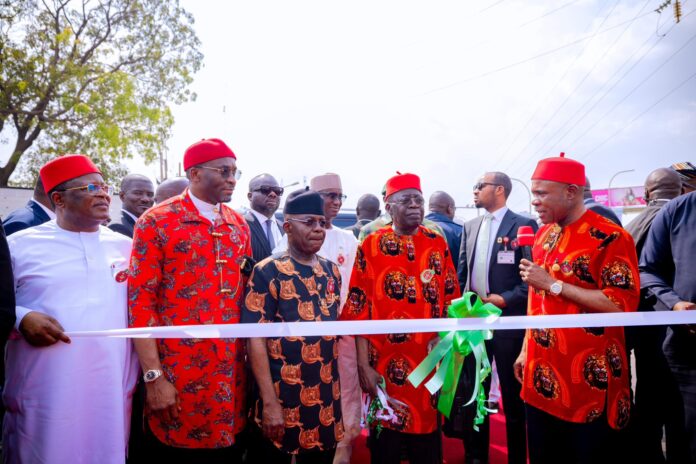President Bola Tinubu has explained his controversial decision to scrap the fuel subsidy, claiming the move was critical to preventing Nigeria from sliding into financial ruin. The President, speaking during a town hall meeting in Enugu State, argued that the removal was necessary to safeguard the future of the nation and its citizens.
“We must build this house called Nigeria to not just satisfy our immediate need, but our tomorrow too,” Tinubu told attendees. “That’s why the removal of the fuel subsidy was necessary. We cannot spend the future of generations yet unborn in advance. Don’t bankrupt the nation before they’re born.”
The town hall meeting came after Tinubu inaugurated key infrastructure projects implemented by Enugu State Governor Peter Mbah. It provided a platform for Tinubu to address public criticism following his May 29, 2023, decision to end the decades-long subsidy policy.
The Subsidy Debate
Nigeria had long subsidized fuel, keeping prices artificially low for consumers. However, the policy became increasingly unsustainable as the nation struggled with dwindling oil revenue, ballooning debt, and rampant subsidy fraud. Estimates suggest Nigeria spent over $10 billion annually on fuel subsidies, a drain on public finances that successive governments grappled with.
While many experts and institutions, including the World Bank and International Monetary Fund, had urged its removal, previous administrations hesitated due to the policy’s unpopularity. For years, ordinary Nigerians benefited from low petrol prices, but this also encouraged overconsumption, smuggling, and financial leakages.
Tinubu’s announcement marked a bold departure from previous attempts, notably former President Goodluck Jonathan’s 2012 attempt to end subsidies, which sparked nationwide protests.
Economic Fallout
The removal of the subsidy immediately sent fuel prices soaring, with ripple effects across the economy. Transportation costs doubled, while prices for essential goods, including food, skyrocketed. Many Nigerians, already grappling with inflation, criticized the government for failing to implement adequate palliatives before the decision.
“You can’t just wake up and remove subsidies without first creating alternatives,” said one critic on social media. “It shows poor planning and lack of empathy for ordinary citizens.”
Others questioned Tinubu’s resolve, pointing to accusations that previous subsidy funds were mismanaged. “We’ve been here before. What’s stopping this money from ending up in the pockets of a few politicians?” queried another citizen during a radio program.
President’s Defense
Tinubu acknowledged the immediate hardship caused by the policy but emphasized its necessity for long-term benefits. He urged Nigerians to see the bigger picture, stressing that tough decisions today were critical to averting a grimmer economic future.
“We cannot allow Nigeria to go bankrupt,” he asserted. “Yes, the journey will be hard, but the destination will be worth it.”
The President also reiterated that removing the subsidy was part of his broader economic reforms to free up resources for critical investments in infrastructure, education, and health care.
What Lies Ahead
In response to public outcry, Tinubu’s administration introduced a series of measures aimed at cushioning the impact of the subsidy removal. These included a plan to distribute palliatives to vulnerable Nigerians, invest in public transportation, and provide cash transfers. However, critics argue that these interventions are insufficient to address the magnitude of hardship caused.
Meanwhile, the federal government has promised to allocate the savings from the subsidy removal to developmental projects. An economic advisory committee is reportedly tasked with ensuring transparency and accountability in managing the funds.
Despite the assurances, public skepticism persists. Analysts suggest the administration must move beyond rhetoric to show tangible improvements in the quality of life for ordinary Nigerians.
Comparisons with Other Countries
Nigeria is not alone in grappling with fuel subsidies. Many oil-producing nations, including Indonesia, Egypt, and Venezuela, have faced similar challenges. Experts frequently cite Indonesia’s phased approach as a model. Under former President Joko Widodo, Indonesia combined gradual subsidy cuts with investments in social programs and infrastructure, helping to cushion the economic shock.
Some have called for Nigeria to adopt a similar strategy. “What Indonesia did was a balancing act,” said an economist. “If Tinubu can implement a robust framework for reform, Nigeria could emerge stronger. But execution will be key.”
Mixed Reactions
The debate over the subsidy removal has polarized Nigerians. While some see it as a painful but necessary decision to stabilize the economy, others view it as yet another burden on the masses in a nation already plagued by high unemployment, poverty, and insecurity.
“Nigeria’s economic challenges require bold moves,” said a university lecturer in Enugu. “Subsidy removal is one of those moves, but government actions must be guided by empathy, fairness, and accountability.”
Meanwhile, supporters of the move point to the potential long-term benefits, including reducing fiscal deficits, curbing corruption, and channeling funds into critical sectors.
Tinubu’s Legacy
With less than a year into his presidency, Tinubu’s administration faces a critical test. Whether Nigerians ultimately embrace or reject the fuel subsidy removal will depend largely on the government’s ability to effectively manage the transition and deliver on its promises.
For now, Tinubu remains adamant about his decision. “I understand the pains, and I ask for your patience and trust,” he said in Enugu. “This is not about politics; it’s about securing Nigeria’s future.”

